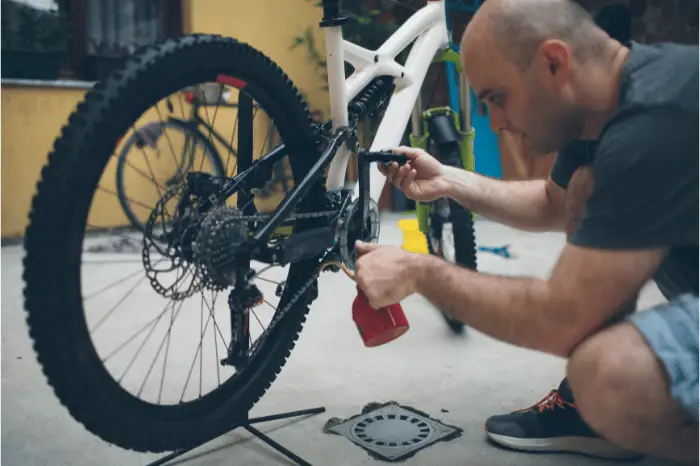
If you’re an avid cyclist or just starting, you’ll eventually need to take your bike in for a tune-up. But how much does a bike tune-up cost? The answer varies depending on several factors, including the type of tune-up you need, where you live, and the bike shop you choose.
A bike tune-up is a maintenance service that ensures your bike is in top working condition. It typically includes a thorough cleaning, lubrication of moving parts, adjustments to brakes and gears, and a safety check. The cost of a tune-up can range from $60 to $250 or more, depending on the level of service you need.
Basic tune-ups are less expensive and typically include a basic inspection, cleaning, and adjustment of your bike’s components, while more extensive tune-ups include additional services such as wheel truing, bearing adjustments, and replacement of worn parts.
Average Cost of a Bike Tune-Up
Maintaining your bike is a crucial part of ensuring it lasts for years to come. One of the most important maintenance tasks is getting a bike tune-up. But how much does a bike tune-up cost? The answer is not straightforward and varies depending on the services included in the tune-up.
According to Hobbybiker, the average cost of a bike tune-up is between $60 and $100. Most bike shops offer two options: a Minor/Basic Tune-up that costs $55 to $89 and a Major Tune-up that typically costs between $119 and $150. The cost often depends on the services included in the tune-up.
A Basic Tune-up typically includes a basic inspection and cleaning of your bike’s components. This process is vital for identifying potential issues, as well as removing dirt and grime that can impede performance. A Standard Tune-up includes all of the services in the basic tune-up, plus more extensive cleaning, lubrication, and adjustment.
If you need more extensive repairs or replacements, the cost of a bike tune-up can increase. For example, if you need new brake pads or a new chain, the cost of the tune-up will be higher. According to BikeSolved, the cost of a tune-up can also vary depending on your location and the bike shop you choose.
It’s important to note that the cost of a bike tune-up is a small price to pay for keeping your bike in good condition. Regular tune-ups can save you money in the long run by preventing major repairs and replacements. If you’re unsure about what services you need, don’t hesitate to ask your local bike shop for advice.
Factors Affecting Bike Tune-Up Prices
When it comes to bike tune-up prices, there are several factors to consider. Understanding these factors can help you determine the cost of a bike tune-up and ensure that you are getting a fair price for the services you receive. Here are the main factors that affect bike tune-up prices:
Type of Bike
The type of bike you have is one of the most significant factors that affect the cost of a tune-up. Different types of bikes have different components, and some require more maintenance than others.
For example, a road bike may require more frequent tune-ups than a mountain bike because it is ridden on smoother surfaces and at higher speeds. Similarly, a high-end bike with advanced components may require more maintenance than a budget bike with basic components.
Local Market Rates
Local market rates also play a significant role in determining bike tune-up prices. The cost of living and average income in your area can impact the rates that bike shops charge for their services. For example, bike shops in urban areas may charge more for tune-ups than those in rural areas because of the higher cost of living.
Level of Tune-Up Required
The level of tune-up required is another factor that affects bike tune-up prices. A basic tune-up that includes adjusting brakes and gears, lubricating the chain, and checking bolts will cost less than a full tune-up that includes cleaning and detailing the bike, replacing cables, and truing the wheels. The level of tune-up required will depend on the condition of your bike and how often you ride it.
Overall, the cost of a bike tune-up can vary depending on several factors. It is essential to find a reputable bike shop that offers fair prices for their services. By understanding the factors that affect bike tune-up prices, you can make an informed decision and ensure that your bike is in top condition for your next ride.
Components of a Bike Tune-Up
When you take your bike in for a tune-up, there are several components that the mechanic will inspect and adjust to ensure that your bike is working smoothly and efficiently. These components include brake adjustments, gear tuning, wheel truing, lubrication, and cleaning.
Brake Adjustments
One of the most important components of a bike tune-up is brake adjustments. The mechanic will inspect your brakes to ensure that they are working properly and adjust them if necessary. This includes adjusting the brake pads, cables, and levers to ensure that your brakes are engaging properly and stopping your bike when you need them to.
Gear Tuning
Another important component of a bike tune-up is gear tuning. The mechanic will inspect your gears to ensure that they are shifting smoothly and efficiently. This includes adjusting the derailleur, cables, and shifters to ensure that your gears are engaging properly and shifting smoothly.
Wheel Truing
During a bike tune-up, the mechanic will also inspect your wheels to ensure that they are true and round. This includes checking the tension of the spokes and adjusting them if necessary. A true and round wheel will help your bike roll smoothly and efficiently.

Lubrication and Cleaning
Finally, the mechanic will lubricate and clean your bike during a tune-up. This includes lubricating the chain, derailleurs, and other moving parts to ensure that they are working smoothly and efficiently. The mechanic will also clean your bike to remove any dirt or debris that may be affecting its performance.
When to Get a Bike Tune-Up
Regular bike tune-ups are essential to ensure that your bike is in good working condition and safe to ride. But how often do you need to get a tune-up? Here are some guidelines to help you determine when it’s time to take your bike to the shop.
Regular Maintenance Schedule
Most bike mechanics recommend getting a tune-up at least once a year, even if you don’t ride your bike very often. This is because, over time, parts can wear down or become misaligned, which can affect the performance and safety of your bike.
If you ride your bike frequently or in harsh conditions, such as rain or mud, you may need to get a tune-up more often. Some experts suggest getting a tune-up every 1,000 miles or every six months, whichever comes first.
Performance Issues
If you notice any performance issues with your bike, such as difficulty shifting gears, squeaky brakes, or a wobbly wheel, it’s time to take your bike in for a tune-up. These issues can be signs of worn or damaged parts that need to be replaced or adjusted.
Post-Accident Checks
If you’ve been in an accident with your bike, even a minor one, it’s a good idea to take your bike in for a tune-up. Even if your bike looks fine on the outside, there may be damage to the frame or other parts that can affect the safety and performance of your bike.
In summary, regular bike tune-ups are important for the safety and performance of your bike. Follow a regular maintenance schedule, and take your bike in for a tune-up if you notice any performance issues or have been in an accident.
DIY vs. Professional Bike Tune-Ups
When it comes to bike tune-ups, you have two options: doing it yourself or seeking professional assistance. Each option has its advantages and considerations, ultimately depending on your skill level, available time, and budget.
Tools and Skills Required for DIY

If you’re considering a DIY bike tune-up, you’ll need to have some basic tools and skills. Here are some of the essential tools you’ll need:
- Allen wrenches
- Screwdrivers
- Chain tool
- Bike stand or workbench
- Lubricants and cleaners
In addition to having the right tools, you’ll need to have some basic mechanical skills. You should be comfortable with adjusting brakes and gears, replacing cables and housing, and removing and installing bike components.
If you’re a beginner, you might want to start with some basic maintenance tasks, such as cleaning and lubricating the chain, checking the tire pressure, and inspecting the brakes and gears. As you gain more experience, you can tackle more complex tasks, such as replacing the cassette or bottom bracket.
Benefits of Professional Service

While DIY bike tune-ups can be rewarding, there are some advantages to seeking professional service. Here are some of the benefits of taking your bike to a professional mechanic:
- Expertise: Professional mechanics have the knowledge and experience to diagnose and fix complex problems that you might not be able to handle on your own.
- Time savings: If you’re short on time, taking your bike to a professional can save you the hassle of figuring out what’s wrong and how to fix it.
- Quality assurance: Professional service comes with a warranty or guarantee, so you can be confident that your bike will be fixed correctly and to your satisfaction.
Of course, there are some downsides to professional service as well. It can be more expensive than a DIY tune-up, and you might have to wait for an appointment or for the mechanic to finish working on your bike.
Ultimately, the decision to DIY or seek professional service depends on your individual needs and preferences.
Frequently Asked Questions
What services are included in a typical bike tune-up?
A typical bike tune-up includes a comprehensive check of your bike’s components, including brakes, gears, wheels, tires, and drivetrain. The bike mechanic will adjust the gears and brakes, lubricate the chain, check tire pressure and inflation, and true the wheels if necessary. The mechanic will also check for any worn or damaged parts and replace them as needed.
What is the average cost for a mountain bike tune-up?
The cost of a mountain bike tune-up varies depending on the type of service required and the location of the bike shop. On average, a basic mountain bike tune-up can cost anywhere from $50 to $75, while a more comprehensive tune-up can range from $100 to upwards of $200. Prices may vary depending on the type of bike being serviced and the additional parts or labor required.
How often should I get my bike serviced to maintain performance?
To maintain optimal performance, it is recommended that you get your bike serviced at least once a year. However, if you ride your bike frequently or in harsh conditions, you may need to get it serviced more often. Regular maintenance can help prevent costly repairs down the line and extend the lifespan of your bike.
Can I expect different pricing for road and mountain bike tune-ups?
The pricing for road and mountain bike tune-ups may vary depending on the bike shop and the services required. However, in general, the cost of a mountain bike tune-up may be slightly higher due to the specialized components and additional labor required to service them.
How long does it typically take to complete a bike tune-up?
The time required to complete a bike tune-up can vary depending on the type of service required and the workload of the bike shop. A basic tune-up can usually be completed in a few hours, while a more comprehensive tune-up may take a day or two. It is best to check with the bike shop beforehand to get an estimate of the turnaround time.
Is investing in an annual bike tune-up cost-effective in the long run?
Investing in an annual bike tune-up can be cost-effective in the long run. Regular maintenance can help prevent costly repairs down the line and extend the lifespan of your bike. Additionally, a well-maintained bike will perform better and be more enjoyable to ride.
